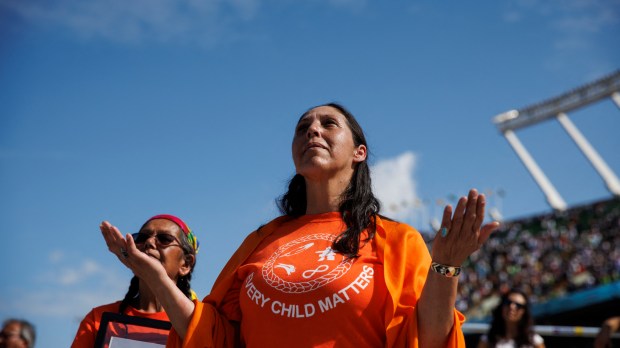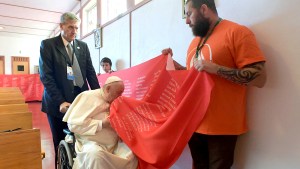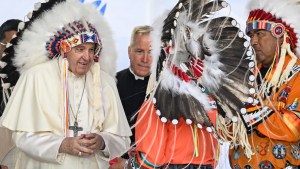On the third day of his apostolic journey to Canada, Pope Francis attended the first public Mass of his “penitential pilgrimage” at the Commonwealth Stadium in Edmonton, the capital of Alberta, where some 50,000 faithful, survivors of residential schools, children of survivors, and Catholics of various backgrounds gathered. I.MEDIA gathered testimonies from the crowd, which express a thirst for healing and reconciliation.
Residential school survivors speak
Lillian Crowchief, from the Siksika Nation in southern Alberta, is a residential school survivor. “I come from a family of eleven children. My parents and grandparents all went to residential school, my three oldest siblings went to residential school. I went to a residential day school,” she explains.
“I’m here to move forward in my recovery,” says Lillian. “I am 60 years old. This is the first time I’ve seen the Pope, and it’s a very important moment in my healing journey.” “My grandparents and parents have passed away, and yesterday when the Pope went to Maskwacis, I was there, and I felt their presence, I was happy to be there for them,” she adds, lowering her voice, obviously moved.
“It’s a blessing to be here with my people, to be here as a survivor, to be together,” adds Lillian, who plans to “continue the healing” at all costs.
“We are here for the Aboriginal people”
“We are here for Aboriginal people,” says a retired Edmonton couple, Sandra and Roger, seated on the central lawn in front of the podium. “It’s time to take the right path, it’s time to be aware of this past and reconcile,” said Roger, who is involved in his parish’s reconciliation ministry and listening process.
The Pope’s trip? “It’s a good start,” he says cautiously. “In the future, we hope to break down all barriers and, as our T-shirt says, walk together. We don’t have to lead or follow, we have to walk together.”
In the stands, a family of nine children has come from Okotoks, Alberta, three hours away. They, too, are guided by the word “reconciliation,” and “not just for Aboriginal and First Nations people, but for all those who have left the church and walked away,” says the father.
“We need to come together in Christ,” he continues, before enthusing, “We fill stadiums for soccer games and everyone is excited; here we fill it for Christ, with Pope Francis, to bring joy and peace to the world, it’s fantastic!”
Mira, originally from Mexico, lives in Calgary, in the same province of Alberta. She is a Catholic, very attached to her faith which is “the center of [her] life”, and she wanted to be present “for the healing” of her host country: “The people here in Canada really need the blessing and the healing. I am part of the church, so I feel committed to that process.
“I’m trying to get back to my roots”
A delegation of Sakjeenj community members, wearing orange T-shirts, came by bus from Manitoba 15 hours away. “My whole family was in residential school,” says Sofia. “We were deprived of our language, our culture, and now we are fighting to get it back.” For the 60-year-old, being here in the crowd “is like a healing process, for everything we had to go through.”
Next to her, Faith, in her thirties, is the daughter of former residential school students. “For me,” she says, “it’s intergenerational healing.” Faith continued, “I grew up as a Catholic in the church, I don’t know anything about my culture, my language. I felt that was taken away from me. Now I’m older, I have children, I’m trying to find my roots on my own.”



